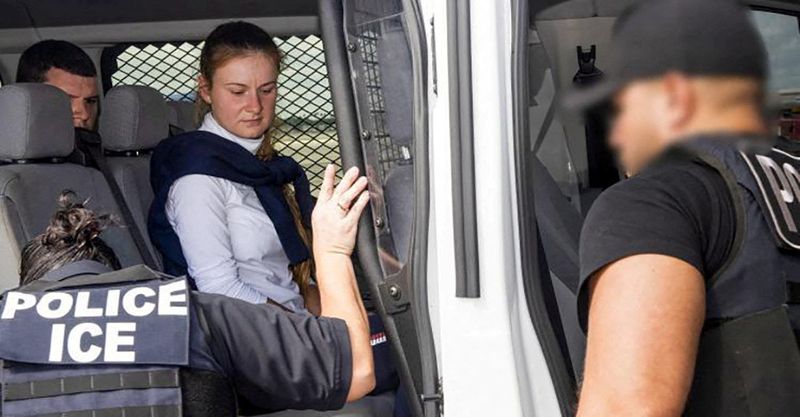By Luc Cohen
NEW YORK (Reuters) - In the five months since the U.S. Department of Justice launched a task force to seize Russian oligarchs' assets to pressure Moscow over its invasion of Ukraine, prosecutors also have targeted something less tangible: Russia's influence.
Prosecutors in that period have charged five Russians with acting on the Kremlin's behalf without registering as foreign agents, as the Justice Department broadly ramps up enforcement of the Foreign Agents Registration Act (FARA) and a related law known by its code number, 951.
FARA and 951 let prosecutors go after broader activity - such as lobbying or running media campaigns - than espionage statutes, which focus on agents seeking classified or military information, experts said.
"The Russian playbook is so much bigger than that," said David Aaron of law firm Perkins Coie, a former national security prosecutor.
In the latest instance, federal prosecutors in Tampa, Florida, last week charged Russian national Aleksandr Ionov with 951 conspiracy for financially supporting U.S. political groups.
In an interview with Reuters on Tuesday, Ionov - who is in Russia - called the U.S. charges "complete nonsense" and a "political decision."
The charges against the Russians come as U.S. prosecutors increasingly wield the two foreign-influence laws, which they previously used only rarely, against a variety of defendants.
Since 2018, the United States has accused 52 people - including Russian, Chinese and American citizens - of violating or conspiring to violate FARA, 951 or both, according to a Reuters analysis of Justice Department statements and records from seven major district courts. In the prior six-year period, just 13 people were charged under those laws, the analysis shows.
Of the 52 people, 13 have since pleaded guilty, including Maria Butina, a Russian student who in 2018 https://www.reuters.com/article/us-usa-russia-butina/butina-admits-being-russian-agent-pleads-guilty-in-u-s-to-conspiracy-idUSKBN1OC1AI admitted to 951 conspiracy by trying to create back channels between Moscow and Republican politicians.
Others charged include Thomas Barrack - a fundraiser for former president Donald Trump's 2016 campaign – who will stand trial next month on charges under 951 of illegally lobbying for the United Arab Emirates. Barrack pleaded not guilty.
Federal prosecutors have also charged several alleged Chinese agents this year and in 2020. Some have pleaded not guilty and others are at large.
The Justice Department declined to comment. Russia has denied interfering in the U.S. election and calls its campaign in Ukraine a "special military operation." Its embassy in Washington did not respond to a request for comment.
CONFERENCE IN YALTA, FORT IN HAWAII
Section 951 was passed as part of the 1917 Espionage Act - enacted partly to combat resistance to the World War One draft - and criminalizes acting as a foreign agent without notifying the U.S. attorney general. While once mainly used against traditional espionage, cases brought in recent years have targeted lobbying and influence operations.
FARA was enacted in 1938 to counter Nazi propaganda. It requires foreign lobbyists to register with the Justice Department. Prosecutors brought a handful of FARA cases in the postwar era; in recent decades, they were wary of bringing charges under an untested statute, experts said.
But in 2019, a Justice Department official said at a legal conference that prosecutors would focus more on FARA in a "big shift https://www.reuters.com/article/usa-trump-lobbying-idINKCN1QO097" spurred by Russia's alleged interference in the 2016 presidential election.
"For national security issues, FARA has become one of the first tools out of the bag," said Matthew Sanderson of Caplin & Drysdale.
In addition to Ionov, the other Russians charged recently include Aleksandr Babakov - a Vladimir Putin-aligned Russian parliament member - and two of his staffers. They were accused in April of hiring consultants to lobby U.S. members of Congress to advance Russia's interests.
Babakov directed an unnamed U.S. associate to invite a U.S. congressman to a 2017 conference in Yalta sponsored by the U.S.-sanctioned leader of Crimea, prosecutors said. The unnamed congressman did not attend.
Babakov could not be reached for comment.
In March, prosecutors accused Elena Branson, a U.S.-Russian dual national, of violating 951 and FARA by receiving $170,000 in Russian state funds to organize an "I Love Russia" campaign for U.S. youth. She also lobbied Hawaiian officials not to change the name of a formerly Russian fort, prosecutors said.
In an October 2021 interview with Russian state broadcaster RT after returning to Russia, Branson said she did not communicate with U.S. politicians. In a March 8 Facebook (NASDAQ:META) post, Russia's embassy in Washington called the charges against Branson "unfounded."
Branson, Babakov and Ionov are believed to be in Russia.

They are unlikely to be arrested by U.S. authorities, but charging fugitives sends a message to Moscow to thwart further activity, said Brandon Van Grack, a partner at Morrison Foerster and former chief of DOJ's FARA unit.
"It is a way to deter the other government - to say 'look, we know what you're doing here, so stop it,'" he said.